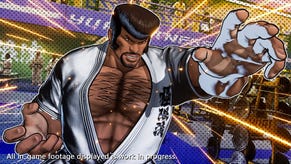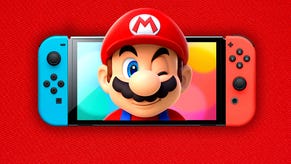The Xbox Story, Part 1: The Birth of a Console
Xbox celebrates its tenth birthday this year, having launched in the US on November 15, 2001. In this four-part special, Patrick Garratt talks to members of the console's original team and tells its release story.
“Have you ever seen an Xbox game?”
I hadn't. Very few people had. I was sitting in a small, bare room at the back of London games show ECTS in September, 2000. I stank of alcohol. I was alone apart from a balding blond man with a big smile. His name was J Allard. I had no idea who he was.
He picked up a Sidewinder PC pad. It was connected to a cabinet, the innards of which were hidden. He played some terrible-looking driving demo. All I remember is a car and a road. He drove along for a few minutes then stopped. He smiled again.
After asking a few questions, the answers to which taught me nothing, I left the room and thanked the PR. The ramifications of what I’d just seen were completely lost on me, a rookie journalist more concerned with drinking through publisher expense budgets than whether or not Microsoft could scale the videogaming equivalent of K2.
We’d all heard of Xbox: it had leaked from ECTS the previous year when Microsoft had first courted potential third-party developers. We knew it was supposed to be a console, a competitor to PS2.
And as such, we knew it would never work.
PlayStation 2 had launched in Japan that March, and was about to release in the rest of the world. Demand was ludicrous. PlayStation was the market. Sony owned consoles. Japan owned console games. And the man with the PC pad in his little room in London wasn’t going to change any of that. Microsoft didn’t understand the console world, as was ably demonstrated by my ECTS appointment.
Not for the first time in my life, I was wrong on every level. My first meeting with Allard came some 18 months after Xbox’s original concept appeared as a side-project at Microsoft’s HQ in Seattle. The story of the people that created the machine, and the impact it would have on the world of games as a whole, is a defining one, as inspirational a business tale as you'll find in any industry.
That driving demo still baffles me, though.
A difficult birth
On March 30, 1999, Ted Hase, a DirectX technician, sent a Powerpoint presentation out to a select group of Microsoft employees that signalled the beginning of a chain of events that would change digital entertainment forever. Hase and three others had been working on a project in secret as a potential way forward for Microsoft’s gaming business.
The following day, the four men told a prep meeting for a Gaming Strategy Review on May 5, 1999 - ordered personally by Bill Gates - that Microsoft should make a videogames console.
Kevin Bachus, Seamus Blackley, Hase and team leader Otto Berkes hardly succeeded in convincing anyone an under-the-TV gaming drive was part of Microsoft’s future, but the seed was sown.
“Everyone started laughing,” Bachus told me.
“They said, ‘This isn’t what we’d intended to get together to discuss, but it’s an interesting idea. Let’s follow up on that.’”
Bachus’s team’s presentation had been made in response to an escalating threat. Microsoft was sick of Sony and its monumentally successful PlayStation program. PS2 had been announced at GDC ’99, and Kutaragi had finally overstepped the mark.
“They started saying things in the press about how they were, essentially, going to destroy PC gaming. Their mantra was something like, ‘Entertainment content requires an entertainment device,’” said Bachus.
“Bill was going on one of his annual think weeks, where he goes off with this stack of documents produced by people across the company on various different topics. He requested that we in the DirectX team do an analysis about what was known about PlayStation 2 and conclude whether, in fact, PC gaming was in danger, whether the PC platform was at risk.”
The quartet came to two conclusions; firstly, the PC was likely to pass PS2 on a technical level, as it had done with every previous console generation; secondly, PC components had reached a price-performance stand-point where they could easily be transformed into a competitive device.
Gates listened when Bachus and the rest told him that Microsoft “should, in fact, do that”: the process began to accelerate.
“After that, Ted, Seamus, Otto and I started having meetings in the conference room in my office. I remember very clearly that we used to bring this big bowl of jelly beans with us. We’d sit there, eat jelly beans and talk about what this thing was going to look like.”
The initial intention was to launch Xbox at the same time as PS2, to conceptualise, build, market and release the machine before the end of 2000. Bachus and friends were nothing if not ambitious.
Given the tiny development timeframe, the Microsoft console’s ideas were fetal compared to the boisterous teenager that was Sony’s PlayStation 2. In the early stages, Bachus and the others wrestled with basic console concepts, ideas of playing games that were completely alien to Microsoft. It had to “fire up immediately”. It wouldn’t have a desktop, or a Start menu, and you’d be able to simply put in a disc and start playing. The caveat was obvious, though: to all intents and purposes, a programmer had to see the box as a Windows PC from a developer stand-point.
“We wanted to kill two birds with one stone,” said Bachus. “We wanted to get into the console business and also reinforce the PC games business with a platform that essentially ran console-like PC games in the living room.”
“Microsoft didn’t take games all that seriously. It just wasn’t seen as important as corporate stuff.”
Most of the discussion time was taken up with how was the group was going to convince Microsoft to wholly support the idea and launch.
“It was a slow, steady process,” said Bachus. “There was a desire at Microsoft to understand the PlayStation 2 threat. There was a desire in the consumer Windows division to put forward a PC strategy to Microsoft’s hardware departments. There was a desire to understand whether or not there was a strategy at Microsoft to play in the sub-$500 hardware device category.
“We simply went and lobbied people. It was such a controversial idea. We would go and talk to people and they’d say, ‘Well, that’s very clever, but we would probably not do it.’
“Microsoft didn’t take games all that seriously, despite the fact that games were the number one or number two thing that people did with their PCs. It just wasn’t seen as important as corporate stuff.”
Microsoft was so heavily involved in developing its Windows, Office and SQL Server businesses that it struggled to see beyond the end of its nose. Microsoft was not an entertainment business: it made corporate software, and companies spent millions of dollars licensing its highly successful products.
The suggestion that Microsoft should launch something along the lines of Xbox was one of revolution. And Bachus and his team weren't the only parties looking to stage a coup.
A question of perception
Microsoft's WebTV group was simultaneously lobbying hard to release its own multi-function living room box, a device that could play games as well as act as a TV and media hub.
In a series of bitter meetings over the best route forward for Microsoft in games - recounted in detail in Opening the Xbox, the account of Xbox’s beginnings written by US journalist Dean Takahashi in 2002 - Bachus and the others eventually won Gates over by being the best bet at staving off Sony and recapturing the hardcore gamer. The thinking was that the WebTV solution would forfeit the high performance demanded by the core by spreading itself over other applications and being a master of none.
The last of these face-offs, and the presentation which proved to be a tipping point in the ultimate decision about which way to go with Microsoft's games effort, took place in June, 1999. It was made to Gates and Steve Ballmer under the auspices of releasing a sub-$500 media box. They showed something new to Microsoft: an instant-on PC.
“No one had ever seen that before,” said Bachus. “We worked with AMD to create a custom BIOS to make a PC that could start up immediately. We said, ‘Look: it can do this.’”
Gates and Ballmer were shown some graphics demos, one of which was an emulated PlayStation game using Bleem!. The main event was a Lara Croft segment: Blackley got her up and running on a screen in front of Gates in under nine seconds from pressing the button on the team’s prototype.
“We said, ‘If we had permission to build this special version of Windows, this is what we would do, and this is what we think the hardware materials would be for a manufacturer to build something like this,’” said Bachus.
“We went and talked to 3dfx, we talked to Nvidia, we talked to ATI and got their thoughts on what this might cost. We talked to AMD.
“We talked to hard drive manufacturers. Windows, at that time, required a hard drive, which is why, frankly, there was a hard drive in the original Xbox. You need a hard drive for Windows. That was the genesis of that.”
Bachus was less than kind about the WebTV proposal.
“They were like, ‘Hold on. We’ve always secretly planned to build a console ourselves. We’ve never bothered to tell anybody this, but this was always the plan,’” he laughed.
“‘That was always the idea. We just kept it a secret from everybody.’”
The approach the other group pushed forward was more radical. The WebTV idea was to copy Sony and Nintendo, to internally create a custom machine built on bespoke processors with software other than Windows.
Bachus waited for “Old Testament Bill Gates” to appear, but there was no shouting. The DX team had a clear understanding of what was happening in the console and PC games businesses at the time, and posited that it was better to lose PC gamers to a Microsoft console than to one made by Sony or Nintendo. Bachus also understood that console gamers played PC games, and vice versa, but they used different platforms to play different software.
The DirectX team emerged from the meeting victorious, but it was far from final approval. Bachus and the others were keenly aware that their console project could be cancelled at any moment. This was not simply a question of logistics and infighting: Xbox was ‘not Microsoft,’ and few people believed it would ever happen.
“I remember very well that Bob Herbold, the chief operating officer of Microsoft at the time, was primarily responsible for Microsoft’s global brand strategy, its global advertising,” said Bachus.
“We talked to hard drive manufacturers. Windows, at that time, required a hard drive, which is why, frankly, there was a hard drive in the original Xbox. You need a hard drive for Windows. That was the genesis of that.”
“A fair bit later in the process, once we’d been given permission to proceed, we were sceptical about Microsoft’s ad agency’s ability to communicate to consumers. We asked Bob for permission to do a nationwide search of ad agencies to try find one that could really go toe-to-toe with Chiat/Day, which was the agency that did the PlayStation campaigns.
“He said, ‘Yeah, absolutely, but give McCann Erickson, our agency, the opportunity to pitch,’ so at least we could say, ‘You’ve had your shot but you failed.’
“So we did that. Their pitch, as I recall, wasn’t terrible, but it wasn’t great, and we found a small boutique ad agency in New York that we really liked. They had really creative ideas; they really understood the marketplace and they understood the consumer. We were very excited.
“We went back to Bob and said, ‘OK. Now this thing is about to be announced, and it’s really going to take off, we’ve found these guys that we like and it’s not McCann Erickson.’
“He said: ‘You can’t do that. If I had ever thought you’d really get permission to do this thing I would never have let you go and do that. You have to use McCann Erickson.’
“It was indicative of the attitude within the company. They were like, ‘They’re never going to be able to do this.’”
Lobbying the games boss
In the battle to get the console project greenlit within Microsoft, Bachus and the rest aggressively targeting specific executives for support, one of the first being Ed Fries.
Fries, then Microsoft’s vice president of game publishing, ultimately became one of Xbox’s best known faces, first taking responsibility for the machine’s first-party line-up before assuming control of both first- and third-party software once Xbox launched. Gates liked Fries because of his successes in PC gaming, and he was a critical ally in the war against the WebTV box.
Fries was attracted to the DX team’s plan because it was essentially one to take PC games onto the television. Fries headed up Microsoft’s entire PC gaming effort, and Bachus saw he understood Xbox because it was a way to extend his business without a huge amount of additional investment.
Fries himself was well-used to being lobbied in this way, but had rebuffed all efforts up to this point.
“I had been approached by groups in the past who wanted to do console things, and in general I had sent them away,” he said.
“I was focused on running our PC gaming business, and getting a lot of traction there. But the DirectX guys came to me at the right time with the right proposal. I had previously turned down, for example, the Windows CE guys, who were working with Sega on Dreamcast and wanted us to port some of our stuff to that.
“But what I liked about the DirectX guys’ proposal was that this new machine would be a lot like a PC. Our PC gaming business had grown a lot, and I was starting to look beyond that and think about how I could take our group into the console world, but the existing consoles were very different; we just didn’t have a lot of console experience on the team.”
While the original machine being pitched was appealing because it had a hard drive and an Intel processor, the fact it was running Windows was a major draw.
“The idea that my group could get into the console business in an easy way was the original appeal for me to getting on board,” he said. “I didn’t realise how much it would change over time, but I think we all learned a lot over the next couple of years.”
Fries never fully moved over to the Xbox project, though, and always maintained command of Microsoft’s PC games while he worked on the machine.
“He wanted, I think at least initially, to maintain some semblance of independence from us, and some semblance of neutrality, but we played very hard to enlist his support,” Bachus said.
Fries’s reticence to drop his PC day job, however, wasn’t out of anything as rudimentary as loyalty to his PC games output: it was a question of common sense.
Fries said: “I never moved onto Xbox full-time. That was actually a sore point for Rick Thompson, who was the original guy that was running the Xbox project.
“Everybody else at the start of Xbox in a big way, people like Kevin and Seamus and Rick, quit their other jobs and dedicated themselves full-time to Xbox. They were kind of mad at me, because I didn’t quit my other job - running the PC game publishing business - to run the Xbox game publishing business.
“To me that made no sense. I was running this big group, hundreds of people making games, and we wanted to make games for this machine. It made sense for me to add to my existing group and make games for that too, leverage what we’d already built.
“I was always continuing to do our PC gaming business in addition to the console business.”
Fries added: "When I was there, I thought constantly that they were both important, and we should invest in both business. And I believe, to this day, that they’re both important.”
As people like Fries became involved and the imminent threat of the WebTV group fell away, the Xbox project entered a new phase within Microsoft - and with it came a new level of difficulty for the growing team.
Part 2 - Gunning for Greenlight.









.jpg?width=291&height=164&fit=crop&quality=80&format=jpg&auto=webp)

.jpeg?width=291&height=164&fit=crop&quality=80&format=jpg&auto=webp)


.png?width=291&height=164&fit=crop&quality=80&format=jpg&auto=webp)

